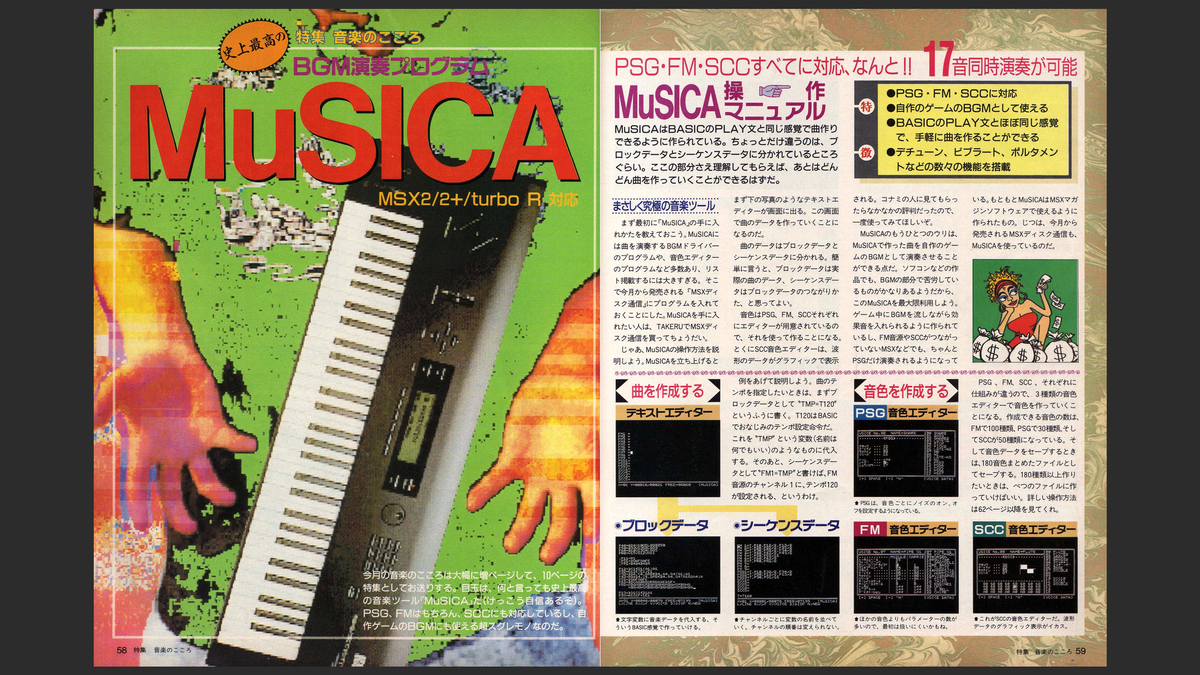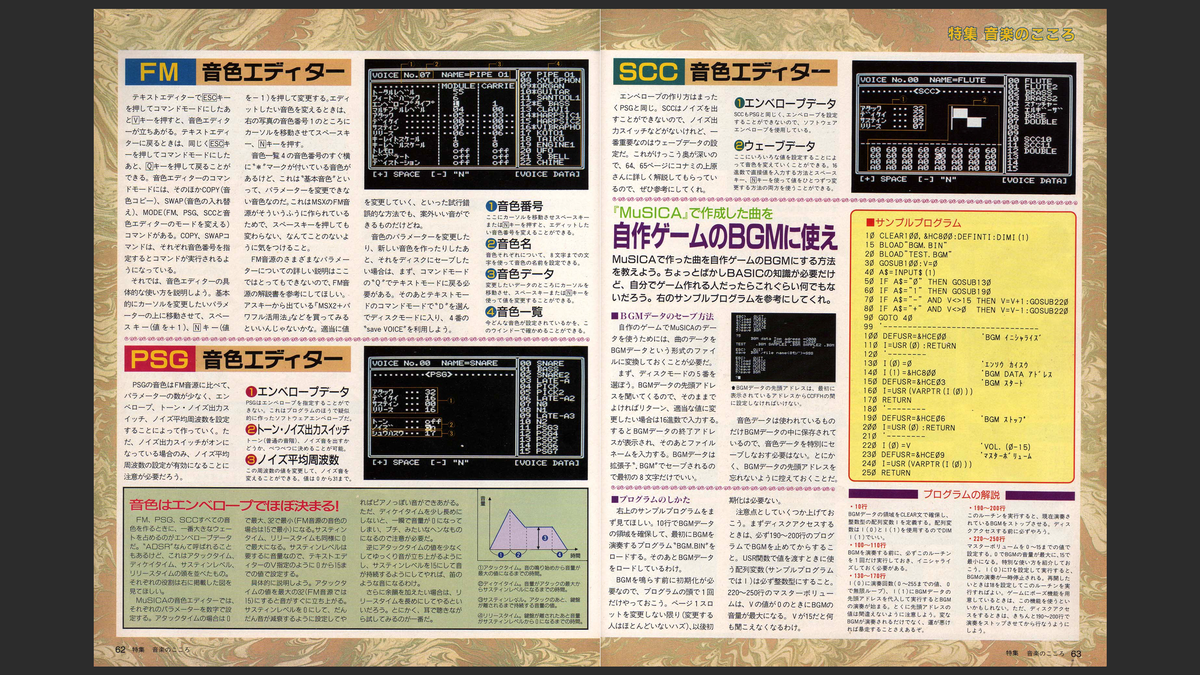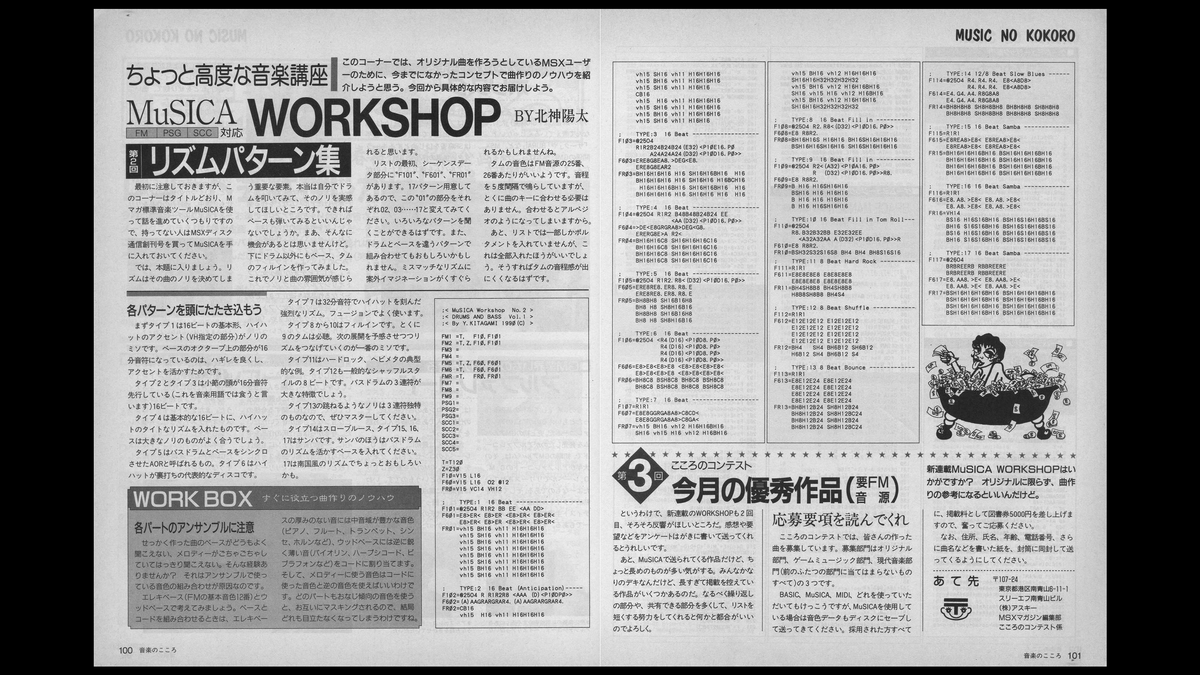Trackers suck.
Posted 6 years ago
MML is better.
Discuss.
https://www.youtube.com/watch?v=zTh8DIocUGw
Replies
Andrew:
Depends. They're different beasts. I personally prefer to code music in MML, but back in the day I worked both with MuSICA and FAC Soundtracker / Moonblaster. We did everything in this music disk with Moonblaster (I did this first song, by the way). Almost everything we did for the Draken Magazine was done with MuSICA.
I'll try and post a video when I have some time.
Trackers and MML both have advantages and disadvantages. The main advantage that MML has is that it is close to sheet music, so actual musicians could use it. Trackers appeal to people without a musical background, offering a more lego-like way of writing music.
For MoonSound Music Studio (MS²), which uses a MML back-end, but currently tracker front-end, I'm constantly trying to figure out how to combine the best features of both MML and trackers.
One thing that is interesting is horizontal versus vertical channel orientation. FAC Soundtracker, the first MSX tracker, used horizontal orientation. All the others modelled themselves after the Amiga and PC trackers and went vertical. Strangely, scrolling tracks with more than 16 steps, or separate effect columns were not popular on MSX, while in my opinion these things are the main motivation for a vertical layout.
However, horizontal display resembles sheet music much closer and also makes a lot of sense for performance reasons in MS² (due to the MML back-end, which groups data on a per-channel basis instead of combining/interleaving all channels on a single step). Additionally, DAW and pianoroll software also has horizontal display.
So I've pretty much made up my mind that MS² needs a horizontal layout. The only question is, should I go out of my way to retain the vertical layout?
EDIT: Oh. You edited your polyphonic typo in the other thing. I completely missed it.
lol. The irony.
Software-wise, I prefer tracker over MML editors. Better overview on what notes and effects are played at what point in time due to its grid-like layout and (in some cases) separate instrument/volume/effect channels, compared to having one "paragraph" with notes, volume/portamento/whatsnot per musical channel.
That has more to do with the style of the programer than a quality of mml itself. It's similar to how coders have different styles of organizing, indenting and commenting their code. I don't use MusicA so I can't attest that you have options besides a single channel header and tons of channel data until you move onto the next channel. But in many other mml dialects, you can (and should!) break up each channel's data for readability.
Take this for example https://www.mmlshare.com/tracks/view/1060 where everything is broken up into phrases of the song. With the exception of the heavy interlacing of effects and instrument changes, it's fairly easy to pick a line, say the NES triangle on channel C, and follow along to what it's doing.
Or this example https://www.mmlshare.com/tracks/view/1007 where I use a lot of whitespace and the result is that it's super easy to follow along with what's going on. Also you can indeed see all the effects at a glance because they're placed in a line above the lines with actual music notes.
I also have been lately visually aligning similar music phrases so that they look vertically aligned from one phrase to another https://www.dropbox.com/s/n65tu7sbnctu0ib/themefix.mus?dl=0
Xyz:
I hadn't heard about MMLShare before. I see the sytnax is different from other MML versions I've seen before (MSX-BASIC's own and MuSICA). I'm not a musician (I suck at composing), but I did some tracks in MuSICA long ago when I was a teenager.
Glad to see other implementations from another platforms!
Is there any MSX tracker for MSX-Music that exports in MML format?
Not that I know of, but you can use MuSICA to compose music directly in MML. It supports PSG, FM and SCC.
If you haven't used it before, there's a very detailed article in the October 1990 issue of MSX Magazine, pages 58-66 (yeah, in Japanese):
About the songs... Well, I think there was an archive of .MSD songs in msxarchive.nl, but I'm not sure it's still there. You can check some MSX Magazines, because from the February 1991 issue they have a section called "MuSICA WORKSHOP" where they publish songs:
You can download a DOS2 compatible version of the MB 1.4 driver, written by BiFi, on MSX Banzai! I don't know how easy it is to integrate into MSX-C, but perhaps Javi can help with this. My only experience with C on MSX was using the SDCC cross-compiler.
Anyway, I agree that there should be one standard to rule them all. This is why I'm writing MS² :) And this is why I know that writing convertors takes A LOT of time.
Generally, it depends on its purpose what functionality is required for musical software.
If you want to make your MSX as musical instruments, it isn't hard to write the software like an FM synth.
However, you might not able to do anything other than music on your MSX instead:)
Actually, the early General MIDI instrument using OPL4 is implemented with 8bit CPU.
I believe someone can rip and port its firmware to MSX and MoonSound;)
BTW, I wrote software that works like an FM synth integrated multiple real sound chips for a Windows PC, but uses a lot of resources despite on modern PC.
Post a reply
Most popular
Most popular threads:






#19 by Javi Lavandeira MODERATORSTAFF
Posted on 23/May/2017 07:09:29
Unless I fucked up with the code you should be able to link or embed the video here: